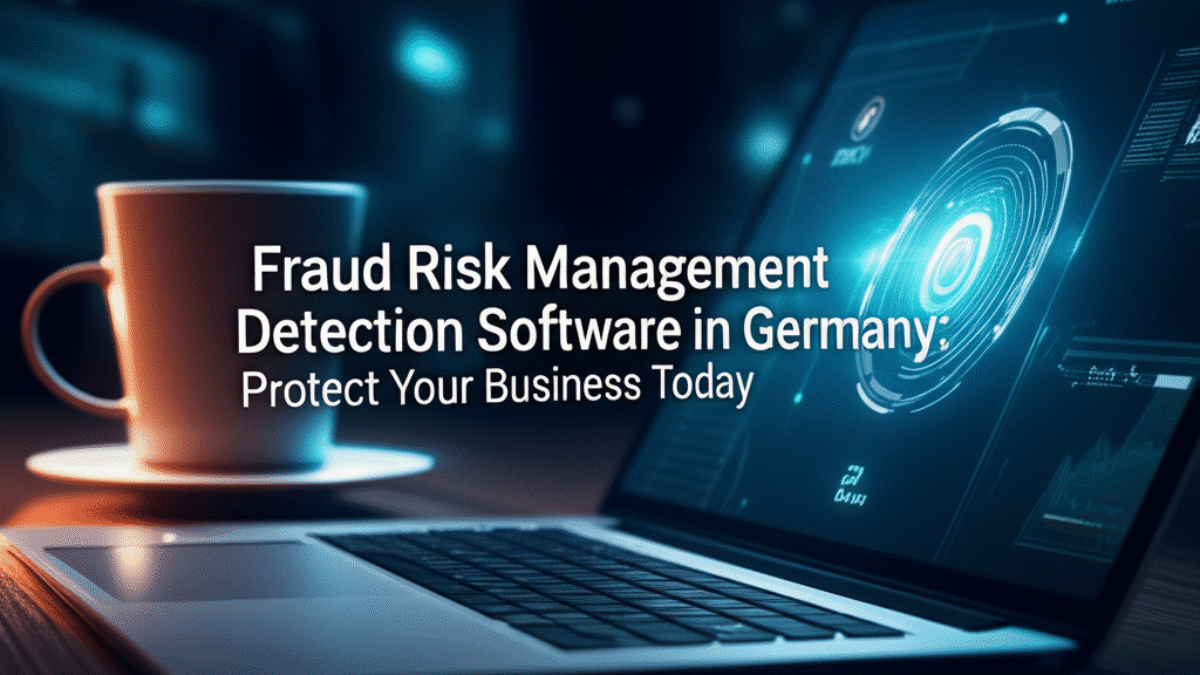In today’s fast-paced digital world, the threat of fraud looms larger than ever. Businesses in Germany, whether small startups or large corporations, face increasing challenges in protecting their assets and maintaining customer trust. Fraud can take many forms—ranging from financial scams to cyber-related crimes—and the repercussions can be devastating. That’s where effective fraud risk management detection software comes into play. It’s not just a tool; it’s a necessity for safeguarding your business. In this article, we’ll explore the top fraud risk management detection software options available in Germany, providing you with the knowledge you need to protect your business today.
As we dive into this topic, you’ll discover the key components of fraud detection software, the benefits these tools offer, and practical applications that can be implemented immediately. We’ll also address common questions surrounding fraud detection, helping you make informed decisions. By the end of this article, you’ll have a comprehensive understanding of how to enhance your fraud prevention strategies and secure your business against potential threats.
Understanding Fraud Risk Management Detection Software
Before we delve into specific software options, it’s essential to understand what fraud risk management detection software is and how it functions. At its core, this type of software is designed to identify and mitigate fraud risks through a variety of methods, including data analysis, machine learning, and real-time monitoring.
Fraud detection software works by analyzing patterns in transaction data, customer behavior, and other relevant metrics. When anomalies or suspicious activities are detected, the software alerts the appropriate personnel for further investigation. This proactive approach can save businesses from significant financial losses and reputational damage.
The Importance of Fraud Detection Software
Fraud detection software serves multiple purposes:
- Prevention: By identifying risky transactions before they occur, businesses can prevent fraud from happening in the first place.
- Detection: In cases where fraud has already occurred, the software helps identify the activity quickly, allowing for rapid response.
- Compliance: Many industries are subject to strict regulations regarding fraud prevention. Using detection software can help ensure compliance and avoid penalties.
- Data Insights: The analytics provided by fraud detection systems can inform broader business decisions and improve overall operational efficiency.
Key Components of Fraud Risk Management Detection Software
Understanding the key components of fraud detection software can help you identify which features are most relevant to your business. Here are the main components to consider:
1. Machine Learning Algorithms
Many advanced fraud detection systems utilize machine learning algorithms to continuously improve their detection capabilities. These algorithms analyze historical data to identify patterns and predict future fraud attempts. As new data is collected, the system learns and adapts, becoming increasingly effective over time.
2. Real-Time Monitoring
Real-time monitoring is crucial for effective fraud detection. This feature allows businesses to track transactions and activities as they occur, ensuring immediate alerts when suspicious behavior is detected. This capability is particularly important in sectors like e-commerce and finance, where rapid transaction processing is standard.
3. User Behavior Analytics (UBA)
UBA focuses on analyzing the behavior of users interacting with your systems. By establishing a baseline of normal user behavior, any deviations can trigger alerts. This component is particularly useful in detecting account takeovers and insider threats.
4. Risk Scoring
Risk scoring assigns a numerical value to transactions or activities based on their likelihood of being fraudulent. This scoring system helps prioritize investigations, allowing your team to focus on the most critical cases first.
5. Integration Capabilities
Effective fraud detection systems often need to integrate with other software and systems within your organization, such as customer relationship management (CRM) and enterprise resource planning (ERP) systems. This integration ensures a holistic view of potential fraud risks across all business operations.
Benefits and Importance of Fraud Detection Software
The benefits of implementing fraud detection software in your business extend beyond mere financial protection. Here’s a closer look at why investing in these tools is essential:
1. Financial Savings
Fraud can lead to substantial financial losses. According to recent studies, businesses can save millions by implementing effective fraud detection systems. For example, the Association of Certified Fraud Examiners reported that organizations with fraud detection software in place experience lower losses compared to those without such systems.
2. Enhanced Customer Trust
Customers are more likely to engage with businesses that demonstrate a commitment to security. By protecting sensitive information and preventing fraud, you enhance customer trust and loyalty. This trust can lead to increased sales and long-term relationships.
3. Improved Operational Efficiency
Fraud detection software streamlines the process of identifying and addressing suspicious activities. This efficiency frees up valuable resources, allowing your team to focus on core business functions rather than constantly monitoring for fraud.
4. Regulatory Compliance
In an era where regulatory scrutiny is increasing, compliance is non-negotiable. Fraud detection software helps ensure that your business adheres to industry regulations, reducing the risk of penalties and fostering a culture of accountability.
Practical Applications of Fraud Detection Software
Now that we’ve covered the key components and benefits, let’s explore how you can implement fraud detection software in practical scenarios:
1. E-Commerce Transactions
In the world of e-commerce, fraud can occur at various stages—from payment processing to account creation. Implementing fraud detection software can help monitor transactions in real time, flagging suspicious activities such as multiple purchases from the same IP address within a short time frame.
2. Financial Services
Financial institutions are prime targets for fraud. By utilizing fraud detection software, banks can detect unusual patterns in account access and transactions, helping to prevent unauthorized access and identity theft.
3. Insurance Claims
The insurance industry frequently faces fraudulent claims. Advanced detection systems can analyze claims data to identify patterns indicative of fraud, such as inconsistencies in provided information or a history of multiple claims from a single individual.
Top Fraud Risk Management Detection Software in Germany
With a clear understanding of what fraud detection software entails and its benefits, let’s explore some of the top options available in Germany:
| Software Name | Key Features | Pros | Cons |
|---|---|---|---|
| FraudNet | Real-time fraud detection, machine learning algorithms | Highly accurate, customizable | Can be complex to set up |
| FICO Falcon | Behavioral analytics, risk scoring | Strong reputation in financial services | Higher cost compared to competitors |
| Actico | Rule-based detection, integration capabilities | Flexible and easy to integrate | May require additional training |
| SAS Fraud Management | Advanced analytics, real-time monitoring | Comprehensive reporting features | More suitable for larger enterprises |
| Oracle Financial Services Analytical Applications | Multi-channel fraud detection, compliance management | Strong analytical tools | Requires significant investment |
1. FraudNet
FraudNet is a leading solution that employs machine learning algorithms for real-time fraud detection. It offers a high level of accuracy, making it suitable for various industries, including retail and finance. However, its complexity during setup may require dedicated IT resources.
2. FICO Falcon
FICO Falcon is widely recognized in the financial services sector for its robust fraud detection capabilities. It leverages behavioral analytics and risk scoring to identify fraudulent activities effectively. However, its pricing may be a barrier for smaller organizations.
3. Actico
Actico stands out for its rule-based detection and seamless integration capabilities. It is user-friendly, allowing businesses to customize their fraud detection processes. While it may require some training for optimal use, its flexibility makes it a valuable option.
4. SAS Fraud Management
SAS Fraud Management offers advanced analytics and real-time monitoring features, providing comprehensive reporting that helps businesses understand fraud patterns. While it’s a powerful tool, it is generally more suited for larger enterprises due to its cost.
5. Oracle Financial Services Analytical Applications
Oracle’s solution focuses on multi-channel fraud detection and compliance management. It’s an excellent choice for organizations looking for strong analytical tools. However, the investment required may be significant, making it more suitable for established corporations.
Frequently Asked Questions
What is fraud risk management detection software?
Fraud risk management detection software is a tool designed to identify and mitigate fraud risks within an organization. It analyzes transaction data and user behavior to detect suspicious activities, alerting businesses to potential fraud in real-time.
How does machine learning improve fraud detection?
Machine learning enhances fraud detection by continuously analyzing historical and real-time data to identify patterns indicative of fraudulent behavior. As the system learns from new data, it adapts and improves its accuracy, making it more effective over time.
What industries benefit most from fraud detection software?
While many industries can benefit from fraud detection software, sectors such as finance, e-commerce, and insurance are particularly vulnerable to fraud attempts. These industries often handle sensitive information and high-value transactions, making them prime targets for fraudsters.
Can fraud detection software be integrated with existing systems?
Yes, many fraud detection solutions are designed to integrate seamlessly with existing systems, such as CRMs and ERPs. This integration allows for a comprehensive view of potential fraud risks across all business operations.
How can I choose the right fraud detection software for my business?
When selecting fraud detection software, consider factors such as the size of your organization, industry-specific needs, budget, and the features that are most relevant to your operations. It’s also beneficial to request demos or trials to assess usability and effectiveness.
What are the costs associated with implementing fraud detection software?
The costs of implementing fraud detection software can vary widely based on the provider, features, and the scale of your organization. Some solutions require a significant upfront investment, while others may offer subscription-based pricing. It’s essential to evaluate the long-term benefits against the costs involved.
Conclusion
In a world where fraud is an ever-present threat, investing in fraud risk management detection software is not just a smart move; it’s a necessity for protecting your business. By understanding the key components, benefits, and practical applications of these tools, you can make informed decisions that enhance your security posture.
As we’ve explored in this article, the right software can save you money, improve customer trust, and ensure compliance with industry regulations. Whether you opt for advanced solutions like FICO Falcon or user-friendly options like Actico, the key is to choose a system that meets your unique needs.
Now is the time to take action. Evaluate your current fraud prevention strategies, explore the software options available, and make the investment that will secure your business against the threats of tomorrow. If you have any questions or need further assistance, don’t hesitate to reach out and engage in the conversation. Protect your business today!


